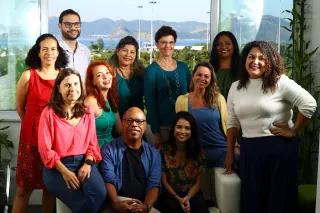The Heinrich Böll Foundation is committed to a critical dialogue on climate and resource policy in Brazil. It also promotes debate and analysis on security and gender policies, the right to the city, the influence of religion in politics and society, and the crisis of political institutions.

It supports national and international exchange on the topics we work on and the participation of civil society organizations and networks in the political dialogue between science, civil society and government institutions. Classical human rights work is still being promoted.
In 2014, Brazil's rapid economic growth, which marked the first decade of the century, came to an end. The economic crisis was the political crisis. Triggered by numerous corruption scandals, it led to the impeachment of former President Dilma Rousseff (PT) in mid-2016 and ends today, 2017, as a massive loss of credibility for the political elites of all parties. In the new political framework, organized civil society must also explore new possibilities of influence. Here, the foundation offers space for debate and promotes dialogue and networking.
The government is trying to boost economic development with radical reforms (labor law, pensions) and the privatization of public infrastructure. Large-scale projects are planned and, in some cases, already started, among others with China, for the logistical development of the Amazon and its resources. In the sensitive ecosystem of Cerrado, in northeastern Brazil, a new, huge soybean cultivation area is to be created with government support. Environmental and social aspects are given little consideration. People who work to protect resources and the environment are increasingly threatened. Here, the Heinrich Böll Foundation supports the partner organizations FASE Amazônia and SDDH as well as the development of networks that visualize the effects of these projects and developments on people and the environment and try to influence political decisions.
Brazil is internationally regarded as a test country for instruments of the Green Economy, in particular for compensation mechanisms in the climate, energy and resource policy. New legislation anchors payments for environmental services (PES), such as REDD + and TEEB, which consider land, forests, but also biodiversity as resources, CO2 storage and investment objects. For many years, the Brazil Office and its partners (Grupo Carta do Belém, FASE, Terra de Direitos, INESC) have been critically examining the implications and alternatives to the new policy instruments. As one of the largest agricultural producers in the world, Brazil is steadily expanding its acreage for agricultural products. Nowhere in the agricultural sector per capita comparison are more harmful pesticides used than in Brazil. To preserve its unique biodiversity, it is becoming more and more important to take legal action against the privatization of seeds, the loss of biodiversity and the use of pesticides, as our partner Terra de Direitos does.
After the organization of major sporting events (World Cup and Olympic Games), the state of Rio de Janeiro is bankrupt. The security situation is more dramatic than it has been for many years, also because many social and prevention programs have been discontinued. As the police and military encroachment on the poorer population has increased sharply, the partner organization Justiça Global is again more concerned with direct human rights work, but also tries to influence the design of security policy. Here, too, the foundation supports networking. 2017 is clear that the games have left little positive legacy. The inhabitants of the slums therefore continue to organize themselves to point out structural problems in Rio de Janeiro and demand changes. Here the foundation works a.o. with the Instituto Raizes em Movimento and the Observatorio das Favelas in the preparation of studies on the key topic of mobility together. Partner in this context is also the research center BRICS Policy Center.
In the fight for women's rights and against homophobia, the growing influence of religious - evangelical and conservative-Catholic groups on society and politics has given way. The influence of women's organizations on the work of thematic advisory councils, which are directly involved in many political decision-making structures in Brazil, has declined significantly. Here the Heinrich Böll Foundation supports the inventory of these regression steps and the reflection on new possibilities of influence of the women's movement, i.a. together with the women's rights organizations CFEMEA, SOS Corpo and SOF. Together with the Institute for Religious Studies ISER, the foundation offers publications and events on the area of conflict between religion and politics.
In view of the loss of credibility of politics, the Heinrich Böll Foundation will increasingly focus on the growing spheres of influence of companies, churches, and others. to discuss political decisions in Brazil and Latin America.
Büro Rio de Janeiro, Brasilien
Director: Dr. Regine Schönenberg
Contact:
Fundação Heinrich Böll
Rua da Glória 190, Ap. 701
2011180 Rio de Janeiro – Gloria
Brasilien
Fon: +55-21-3221 9900
E-Mail: br-info@br.boell.org
Website: www.br.boell.org
Twitter: www.twitter.com/hbsbrasil
Facebook: www.facebook.com/bollbrasil
Instagram: www.instagram/heinrichbollbrasil